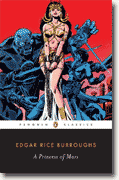A Princess of Mars
Edgar Rice Burroughs
book reviews:
· general fiction
· chick lit/romance
· sci-fi/fantasy
· graphic novels
· nonfiction
· audio books
· author interviews
· children's books @
curledupkids.com
· DVD reviews @
curledupdvd.com
newsletter
win books
buy online
links
home
for authors
& publishers
for reviewers

 |
A Princess of Mars Edgar Rice Burroughs Penguin Classics Paperback 224 pages January 2007 |
|
Before there was Tarzan of the Apes, there was John Carter of Mars. Born in Chicago in 1847, Burroughs published first novel, A Princess of Mars
John Carter, a Confederate Civil War officer, leaves a strange manuscript to one of his nephews, Edgar Rice Burroughs. He is instructed not to reveal the contents of the manuscript until twenty-one years after “Uncle Jack’s” death, and he, of course, honors that promise. Both Carter and Burroughs value the concept of honor and of chivalry; these two virtues are the foundation of their lives. After the war ends, Carter becomes a gold miner. Through a series of sad events, his partner is surrounded by Apaches, and Carter, in a failed rescue attempt, winds up in an Arizona cave, the portal, it seems, to and from Mars. How the transfer is made is never really detailed; he is simply unconscious in one place and awakes in another. Naked he came to the planet earth, and naked he arrives in Barsoom, but it matters little as most everyone is naked on Mars. The difference in gravity puts Carter at a distinct advantage; he is able to leap about and is far more agile than most of the natives. First Carter is captured by the giants of Mars, fifteen feet tall and roughly four hundred pounds in weight. This green race is a warrior society; gentle emotions are considered weaknesses. They adopt Carter more or less due solely to his fighting ability. His captor, Tars Tarkas, eventually becomes the head of the community, and Carter’s devoted friend. One of the women, Sola, is assigned to meet Carter’s needs and teach him the language and customs of the people. Unlike most of her companions, she has a soft spot for the man and befriends him as much as she is able. The women of this world are responsible for training the young and produce everything used by green Martian. The men on the other hand, are the warriors and make the laws as need; as each new situation presents itself, a new law is made. As Burroughs wry notes, “In one respect at least the Martians are a happy people; they have no lawyers.” Time moves swiftly on Mars. In just a few days, Carter tames his Martian watchdog, Woofa, a ferocious beast who would die for him, and also tames the wild, barely-broken riding beasts the green men use for transportation. The entire camp is soon in an uproar when another captor is brought in; the lovely red-skinned Dejah Thoris. She is in size and configuration similar to the women Carter knew on Earth. She is a prize captive, however, a princess worth a great deal as a bargaining chip. The two fall in love, though it seems doomed as long as they are both captive. Like any man on any planet, Carter’s knowledge of women and their ways falls short and makes for some perhaps unintentionally humorous scenes. Brave and skilled in war, he fumbles a bit on the courtship front due more to his innate failings than the differences in home planets. The struggles the couple endure as they try to escape the hands of the red Martians are as riveting now as it was when I first read the book. Carter is an exciting hero, and I agree with Seelye that his descendant can only be Han Solo. The book ends in a cliffhanger that is a hook for the reader to get the next in the series. I had forgotten that part and was suitably chagrined when the action came to a halt. Fortunately, I was able to get the rest of the series and enjoy the further adventures of John Carter. Hollywood made mincemeat of Burroughs’ other hero, Tarzan. I can only hope the powers that reign over film continue to ignore this body of work, for it has become almost a secret pleasure to read action scenes and interpret them each to their own imagination. If you’ve never read this series, do so, by all means. Originally published on Curled Up With A Good Book at www.curledup.com. © Pamela Crossland, 2007 |
|
|
|
 Click here to learn more about this month's sponsor! |
|
| fiction · sf/f · comic books · nonfiction · audio newsletter · free book contest · buy books online review index · links · · authors & publishers reviewers |
|
| site by ELBO Computing Resources, Inc. | |
 I first read this book as a ten-year-old girl, swiping it off my brother’s bed when he wasn’t looking. I eventually returned it, of course, but not before I had read it twice over under the covers by flashlight. Reading it now, I am struck not only by the fast-paced action of the novel but by the quality of writing that can be a bit hard to find in this genre. No matter what we know about the planet Mars now, this is still a riveting tale.
I first read this book as a ten-year-old girl, swiping it off my brother’s bed when he wasn’t looking. I eventually returned it, of course, but not before I had read it twice over under the covers by flashlight. Reading it now, I am struck not only by the fast-paced action of the novel but by the quality of writing that can be a bit hard to find in this genre. No matter what we know about the planet Mars now, this is still a riveting tale.